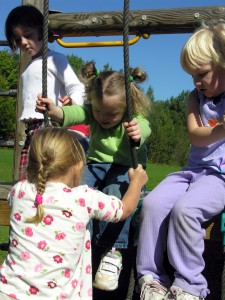National Resources/Related Links
Behavior – Social-Emotional Development
Inclusion
- CAST — a nonprofit research and development organization that works to expand learning opportunities for all individuals, especially those with disabilities, through Universal Design for Learning.
- Center for Inclusive Child Care – Information Modules – General disability topics and specific disability topics
- California MAP to Inclusion and Belonging –The newly updated California M.A.P. to Inclusion and Belonging…Making Access Possible website. The MAP Project supports the inclusion of children with disabilities and other special needs ages birth to 21 in child care, after school and community settings. This site provides many resources including training materials, handouts, and web sites.
- Caring for Our Children, 3rd Edition – is intended to be used by all who care for young children in early care and education settings and who work toward the goal of ensuring that all children from day one have the opportunity to grow and develop appropriately, to thrive in healthy and safe environments, and to develop healthy and safe behaviors that will last a lifetime. The new third edition contains significant content and format changes. Chapter 8 covers children with special health care needs and disabilities. The appendices include sample forms such as a care plan for children with special health needs and medication administration forms.
- Connect Ability – Supported Inclusion: Skills for Success: Adapt and Accommodate
- Financing Strategies and Collaborative Funding – a new toolkit for economic collaboration to support inclusive early childhood programs developed by NECTAC—the national early childhood technical assistance center. This online toolkit includes a collection of collaborative strategies, sample interagency agreements, planning tools, and funding sources to assist states and communities in providing inclusive preschool special education services.
- Growing Ideas Tipsheets – These materials offer early childhood and school age care professionals information on a variety of topics in the form of tipsheets, resource pages, and an expanded virtual toolkit.
- A Guide to Creating Accessible Play Spaces – “This toolkit has all the information and best practices your community needs to design an accessible play space that children of all abilities can engage in and enjoy.” This 96 page PDF was created in 2020 by the Rick Hansen Foundation and presented by Boston Pizza Foundation Future Prospects and Scotiabank. Note: because this document was created in Canada, the information, checklists and standards stated provide current, best practice planning, and design guidance but do not necessarily align with the Americans with Disabilities Act (ADA).
- Head Start Center for Inclusion – Their overarching goal is to increase the competence, confidence, and effectiveness of personnel in Head Start programs to include children with disabilities. Look here for training materials, tools for teachers and coordinators, as well as other resources.
- National Center on Accessibility – The National Center on Accessibility promotes access and inclusion for people with disabilities in parks, recreation and tourism.
- Designing for Inclusive Play: Applying the Principles of Universal Design to the Playground
- Access to Play Areas – A publication designed to assist park and recreation professionals, designers and consumers in creating inclusive play environments for children with and without disabilities.
- National Professional Development Center on Inclusion – is working with states to ensure that early childhood teachers are prepared to educate and care for young children with disabilities in settings with their typically developing peers
- NICHCY, the National Dissemination Center for Children with Disabilities served the nation as a central source of information on disabilities in infants, toddlers, children, and youth until the project’s funding ended on September 30, 2014. Much of the rich library of materials and publications that NICHCY produced over the years is now archived on the Center for Parent Information and Resources website.
- Making Your Playground Accessible (PDF) – A lot has been learned about making child care and preschool programs physically accessible as well as playfully accessible to children with disabilities. This PDF by Youngstar, Wisconsin’s Child Care Quality Rating & Improvement System provides some ideas to do this.
- National Program for Playground Safety : Appropriate Environments – A crucial health and safety factor with children’s outdoor environments is the appropriateness of the environment.
- Early Childhood Technical Assistance Center (ECTA) – ECTA Topic on Inclusion web site is designed for the administrators of state agencies responsible for services to young children and their families, including child care, Head Start, education, and early intervention.
- SpecialQuest Birth to Five Multimedia Training Library – Three training modules and additional resources. Modules focus on collaboration, teaming and working with families. New Preschool adaptations.
- The Child Care Law Center – a national nonprofit legal services organization. The Center’s work includes promoting equal access to child care for children with disabilities.
- Key Internal and External Spaces (PDF) – Universally Designed Early Learning and Care settings should provide internal and external spaces that support the needs of all users and provide an optimum environment for all children’s learning and care. DCYA in collaboration with CEUD-NDA.
Updated: 09/11/2023
